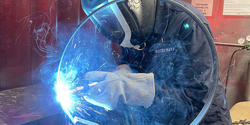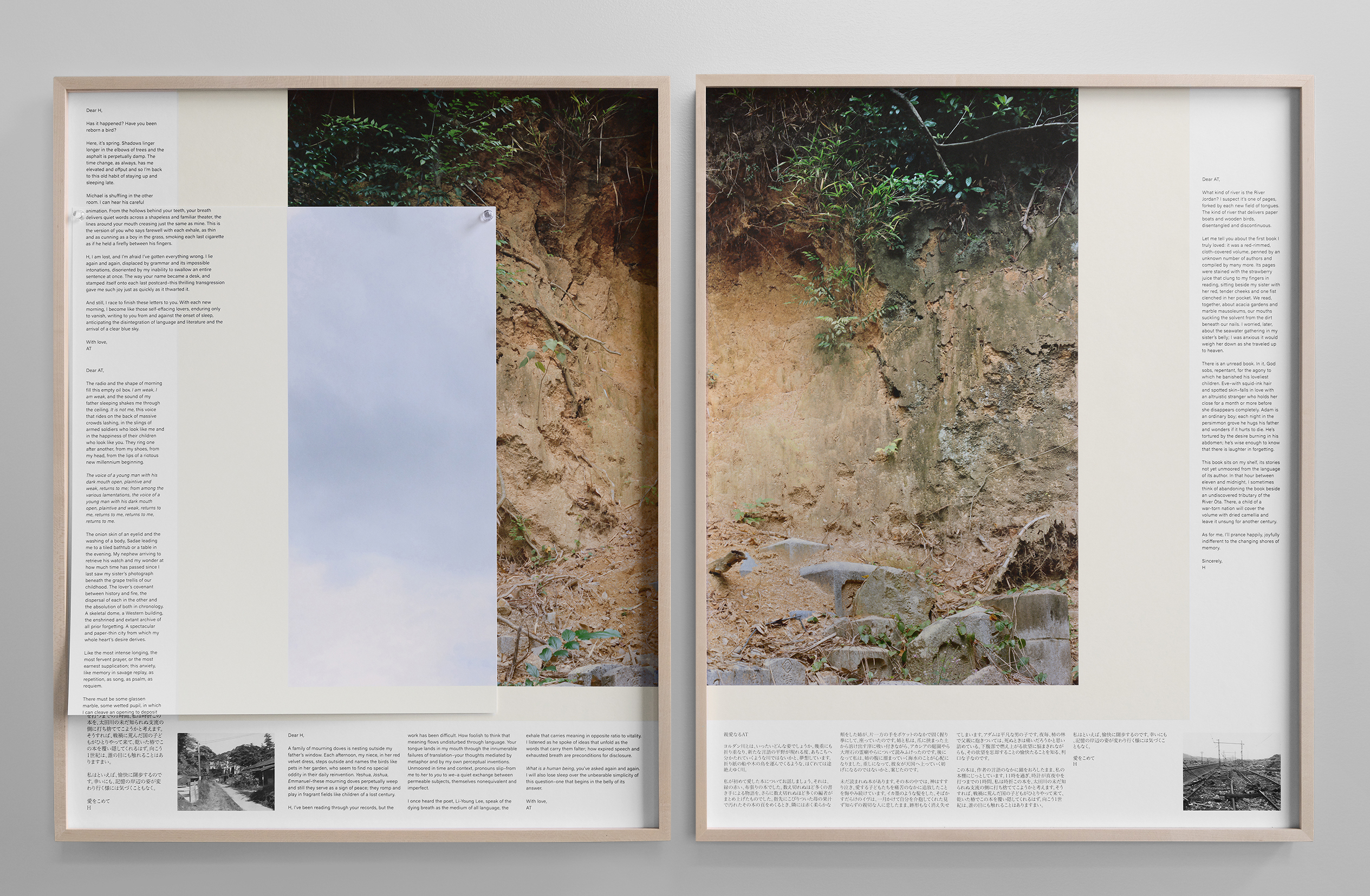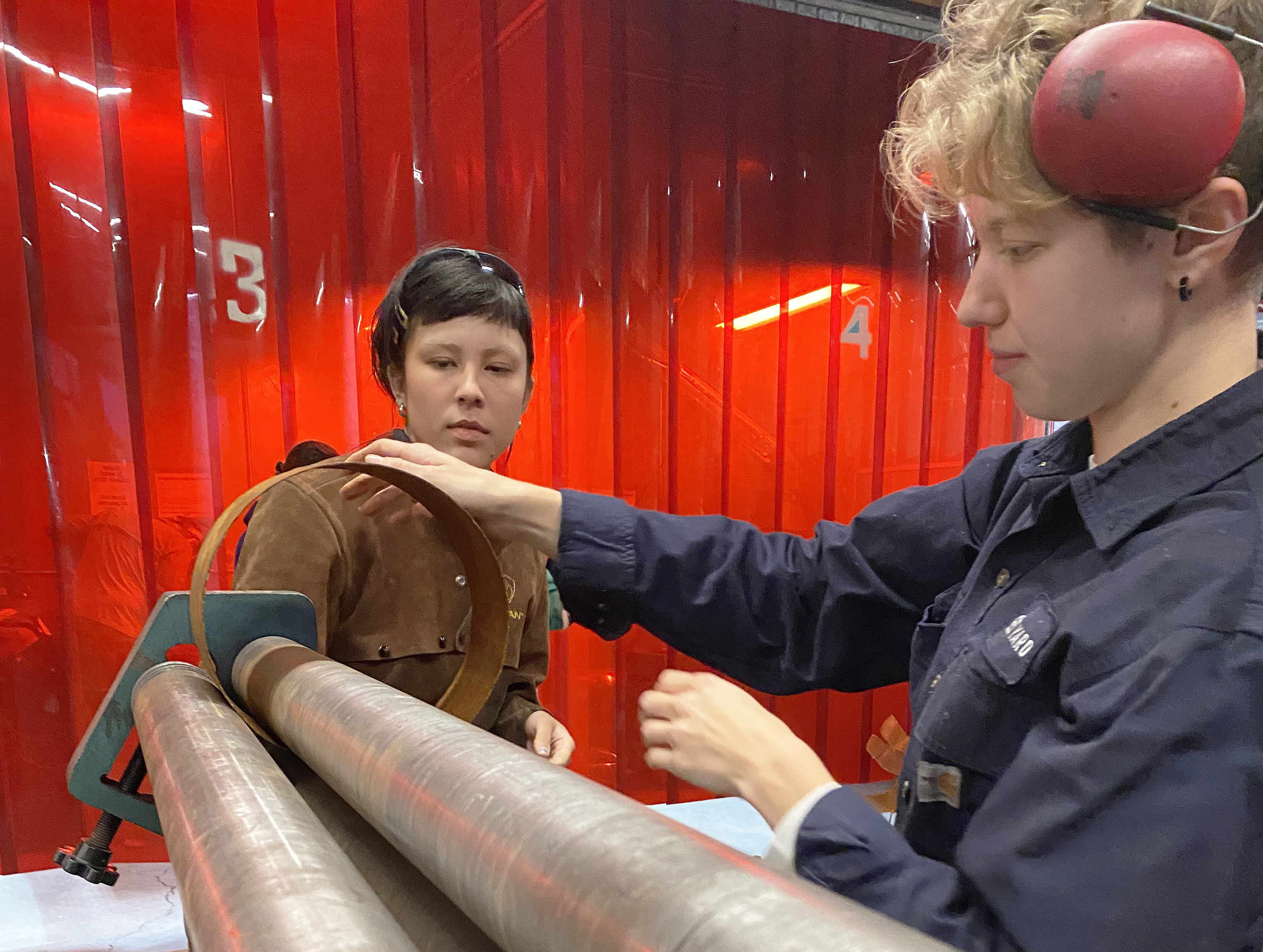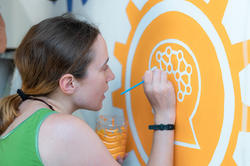Juniors Gina Vestuti and Yukti Agarwal are using grants awarded by RISD Research to document the work of blues musicians in the US and traditional weavers in India.
SPUR Grants Continue to Support RISD Students, Alums in Local and Global Research

RISD students and recent alums are conducting art and design research projects from Providence to Lebanon with support from Student Provisional Ubiquity Research (SPUR) grants. Offered through RISD Research, these grants are awarded for projects that foster diverse perspectives, address community concerns and promote equity.
Allie Tsubota MFA 22 PH used a SPUR grant to support her artist residency with ARCUS Project in Moriya, Japan, and her ongoing project, Dead Letter Room, which engages with images from the end of the Asia-Pacific Wars and World War II, specifically materials from the 1945 United States Strategic Bombing Survey. The project also draws on texts by Hara Tamiki, a late Japanese writer and survivor of the bombing of Hiroshima. During her residency, Tsubota met with Japanese postwar and literary scholars and photographed Japanese landscapes, including sites Hara may have visited.
“At the center of this project are a series of epistolary texts between myself and Hara,” Tsubota says. “Like my visual dialogues with historical photographs, the texts draw the edges of the past and present closer together; they strive to build intimacy between temporally and spatially distant subjects.”


Prateek Shankar MA 22 GAC received a grant to support his work on Worlding Englishes/A Living Archive, a digital sound archive that captures what he calls “the diverse textures of non-standard English registers,” including African American Vernacular English, Nigerian Pidgin and Singapore Colloquial English, among others.
“Creating the archive builds on my Global Arts and Cultures thesis focused on the colonial afterlife of the English language,” Shankar says. “I envision the project’s final form as an open and searchable archive of World English samples and meta-commentary and reflections from individual interviewees on their experiences with these linguistic registers.” He’s also compiling an evolving body of digital and physical “thinking-art objects and experiences” that invite audiences to contemplate and play with the contemporary uses of English.
The Worlding Englishes team, which includes RISD and Brown faculty members, students and alumni, spent a year on research and development before launching interviews with local and global speakers of diverse Englishes. To date, they have reached 54 interviewees between the ages of 18 and 74, representing 19 nationalities and 17 ethnicities, among other identity-based, thematic and generational intersections. Shankar is developing the project’s next phase, which will include fieldwork in Asia.
Recent grant recipients also include Aya Abdallah MFA 24 DM, who attended a two-week summer lecture series at the Beirut Institute for Critical Analysis and Research (BICAR) in Lebanon; Madeleine Young 23 FD, who conducted research on natural patination techniques on ferrous metals during her residency at the Steel Yard in Providence; and Jack Madden MFA 22 DM, who attended a conference and presented his research on a method for visualizing important scientific discoveries in the search for life in a universally understood way.

“I believe in engaging with education methods outside of a traditional institution in order to craft and share a practice of reciprocity.”
Abdallah says, “The BICAR courses on historicity and universalism relate to my thesis research and allowed me to reflect on my hypothesis, and attending the school allowed me to receive support and feedback on my artistic practice from people in my own community.”
Young conducted independent research and learned from Teruko Kushi, a professional metal worker and finisher based in New York. “I believe in engaging with education methods outside of a traditional institution in order to craft and share a practice of reciprocity,” she says. “As part of my work, I am building a patina library and leading workshops at the Steel Yard here in Providence.”
Madden, an astrophysicist as well as an artist, says that his research “highlights how art and science can work together on the same issue to uncover a richer understanding of reality. Science and art work best in collaboration to reveal our place in the universe,” he adds. He used his SPUR funding to attend the Penn State Search for Extraterrestrial Intelligence (SETI) Symposium, where he gave a talk called The Power of Collaborating with Artists in the Search for Life.
Director of Research Soul Brown says, “The range of issues RISD student researchers interrogate with SPUR Fund support is impressive. Their inquiries address hidden histories long buried within western traditional storytelling and push back at colonial hegemony to show how ordinary people reorganize dominant systems to fit within their cultures. I’m so gratified that our grants allow students to delve into novel techniques that can enhance their practices.”
Sign up for RISD Research’s bimonthly newsletter to learn more about the SPUR Fund and other grants.
Lauren Rebecca Thacker / top image courtesy The Steel Yard
January 18, 2024


